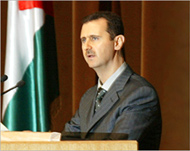Syria looks to ease emergency law
Syria’s ruling Baath Party congress is wrapping up four days of talks, paving the way for modest reforms and elections to key leadership posts.

The Baath party has declared its intention to loosen its government grip, allowing greater political plurality, and to relax the emergency law that allows arbitrary arrest and liberalise the media to allow stronger press freedom.
Aljazeera’s correspondent reported that new leadership elections are expected shortly in the Baath party, with the posts for number two in the party, the two vice-presidents’ posts and ministerial portfolios including defence and parliament speaker up for change.
Vice-President Abdel Halim Khaddam already has announced his intention to stand down.
Syria long has faced international calls to democratise a system that allows only 10 allied parties under the auspices of the ruling Baath.
But few are holding out for fully fledged democracy or an immediate end to the emergency law in place since 1963.
“They … focused on separating the party completely from the executive. The party will only exercise its political role in supervising and strategising. It will give guidance only,” said Expatriates Minister and congress spokeswoman Buthaina Shaaban.
She gave scant details on the third day of talks, but other Baath Party officials said the changes meant senior government positions would no longer be reserved for the party’s top brass.
Lebanon withdrawal
That comes hand in hand with a possible amendment to Article 8 of the constitution, diluting a clause that now identifies the Baath as “the leading party in the society and state”.
“The changes will mean it is no longer necessary for party leaders to get top government roles nor for government leaders to be senior party officials,” prominent party member Ahmad al-Haj-Ali said.
|
“The changes will mean it is no longer necessary for party leaders to get top government roles nor for government leaders to be senior party officials. Article 8 will probably make the Baath a ruling party rather than the ruling party” Ahmad al-Haj-Ali, |
“Article 8 will probably make the Baath a ruling party rather than the ruling party.”
The congress is also likely to scale back the Country Command, the party’s top body, from 21 members to around 15 about half of whom are expected to be new faces.
Syria, forced this year to bow to a United Nations demand and withdraw its troops from Lebanon, has been under US and European pressure to introduce economic and political reform.
Western diplomats and analysts say reforms under discussion at the first Baath congress since 2000 do not go far enough.
Liberalisation?
“We expect no major surprises. They may amend parts of the emergency law, perhaps easing up on the press,” said one diplomat.
“President Bashar al-Assad gave a speech in 2000 focusing on corruption. Five years later he gave a speech focusing on the same theme. What happened in between?”
 |
|
Bashar al-Assad is under intense |
In those five years, Syria has allowed private sector banks to open, ending four decades of state monopoly.
Al-Assad freed hundreds of political prisoners and Syrians can speak more freely now without fearing arrest.
But diplomats, analysts and opposition activists say reforms are piecemeal and have not moved fast enough.
Baath members point to new plans to allow independent media. Almost all local press, television and radio is now state-run.
Political parties
But plans to allow parties draws the line at those based on ethnic or religious interests, effectively keeping Kurdish and Islamist parties out of the new system.
Al-Assad said reforms had been hampered by regional tension and a lack of expertise at home. Baathists say it is unrealistic to expect change overnight.
“We want to be quick in implementation … The decisions of the congress are binding and will be discussed in parliament,” Haj-Ali said.
“But it will take time for people to get used to the idea that you no longer join the Baath because you want a job. This is the problem in the link between the party and power. The birth of new parties takes time.”
Incidentally, in an Aljazeera Arabic website poll 61% of the respondents expressed low expectation of imminent change in Syria after the party congress.